Overview
This article serves as a compassionate guide for parents navigating the challenges of managing ADHD, anxiety, and OCD in their children. It underscores the critical importance of early diagnosis and effective management techniques, while advocating for collaboration with educators and healthcare providers to foster a nurturing environment.
Supported by statistics and real-life case studies, the article highlights the prevalence and complexity of these conditions among youth, offering parents valuable insights and strategies to better support their children. By sharing relatable experiences and encouraging open dialogue, we hope to empower parents to take informed actions and seek the necessary resources for their families.
Introduction
In the complex world of childhood mental health, conditions like ADHD, anxiety, and OCD often overlap, presenting unique challenges that require thoughtful navigation. For parents and caregivers, understanding these conditions—marked by symptoms such as inattention, excessive worry, and compulsive behaviors—is essential to providing the support their children need. Did you know that nearly 78% of children diagnosed with ADHD also face at least one additional condition? This statistic underscores the critical importance of early diagnosis and intervention.
This article explores the definitions, symptoms, and management strategies for these interconnected disorders. By offering insights, we aim to empower families to advocate for their children's needs and create a nurturing environment that promotes their growth and well-being. Together, we can navigate this journey with compassion and understanding.
Understanding ADHD, Anxiety, and OCD: Key Definitions and Symptoms
Attention-Deficit/Hyperactivity Disorder (ADHD) is a neurodevelopmental condition that many children experience, marked by ongoing patterns of inattention, hyperactivity, and impulsivity. For these children, focusing on tasks, following instructions, and staying seated during activities can be significant challenges. These symptoms can greatly affect their academic performance and social interactions, leaving parents and guardians feeling concerned and seeking support.
In contrast, anxiety disorders involve excessive worry or fear that can disrupt daily life. Children with ADHD often exhibit signs of anxiety, such as restlessness, fatigue, and difficulty concentrating, which can exacerbate the challenges they face. Recent statistics reveal that nearly 40% of youngsters with ADHD also struggle with anxiety, highlighting the frequent overlap of these conditions and the importance of understanding their relationship.
Moreover, an alarming 78% of youth diagnosed with ADHD also have at least one additional condition, with behavioral issues and anxiety being the most common. This statistic underscores the complexity of ADHD and the need for comprehensive care.
Obsessive-Compulsive Disorder (OCD) is another condition that can occur alongside ADHD and anxiety, further complicating the situation. OCD is characterized by intrusive thoughts (obsessions) and repetitive actions (compulsions) that individuals feel compelled to perform. While the typical age of onset for OCD is around 19 years, it can emerge in younger individuals, making early identification and intervention crucial for effective management.
Recognizing these symptoms is essential for parents and caregivers, as it lays the groundwork for effective management and intervention.
Key Symptoms:
- ADHD: Inattention, hyperactivity, impulsivity.
- Anxiety: Excessive worry, restlessness, fatigue.
- OCD: Intrusive thoughts, compulsive behaviors.
Understanding these symptoms is the first step toward implementing effective strategies for management and support. It’s also vital to note that individuals with Medicaid may be less likely to receive ADHD treatment from healthcare professionals, such as psychologists or psychiatrists. This reality highlights the necessity for advocacy in securing appropriate care.
With nearly 78% of youngsters diagnosed with ADHD, anxiety, and OCD experiencing at least one other issue, it is crucial for parents and guardians to remain vigilant and proactive in addressing these challenges. A case study titled 'Co-occurring Conditions in Children with Attention Deficit Hyperactivity Disorder' illustrates the complexities involved in managing ADHD alongside other issues, reinforcing the importance of understanding these comorbidities. Together, we can foster a supportive environment for our children, ensuring they receive the help they need to thrive.
Common Challenges in Managing ADHD, Anxiety, and OCD in Children
Navigating the complexities of ADHD, anxiety, and OCD in young people can be overwhelming for parents, each challenge demanding careful attention and compassion. Consider this:
- Behavioral Issues: Children often exhibit disruptive behaviors, making public settings or home life particularly challenging. A national survey conducted in 2022 revealed that nearly 78% of children with ADHD, anxiety, and OCD also struggle with at least one additional condition, highlighting the intricate nature of these behavioral issues.
The emotional turmoil associated with ADHD, anxiety, and OCD can deeply affect a young person's mood and actions. Experts note that these individuals are at a heightened risk for emotional distress, which can exacerbate their symptoms and lead to further complications in daily life. As Drs. Janardhan Reddy, Adam Lewin, and Alice de Mathis point out, grasping these emotional hurdles is vital for effective management.
- Social Difficulties: Many children find it hard to forge friendships or engage in group activities due to their symptoms. This social isolation can foster feelings of loneliness and frustration, making it crucial for parents to explore strategies that promote social skills development.
- Academic Challenges: Attention-related difficulties can significantly impede a young person's learning journey, causing frustration for both the child and their parents. A study found that 48% of adults with ADHD, anxiety, and OCD also faced comorbid OCD, suggesting that these issues may linger into adulthood if not addressed early. Furthermore, disparities in access to ADHD treatment, as highlighted in the case study.
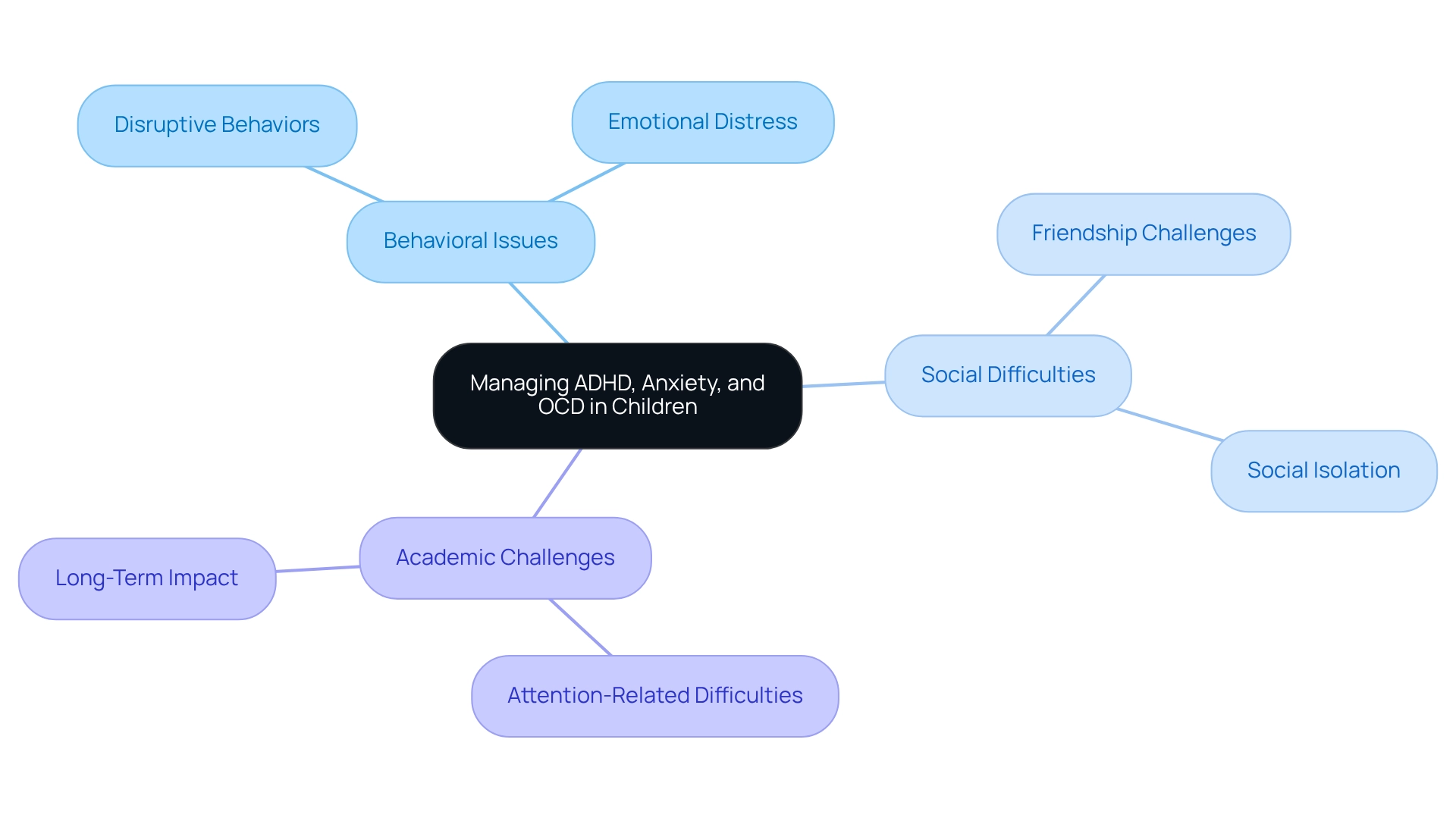
The Importance of Early Diagnosis and Intervention
The early diagnosis of ADHD, anxiety, and OCD is crucial for effective management and can significantly shape a young person's future. Research shows that children who receive early intervention are more likely to experience positive outcomes, including:
- Improved Academic Performance: Early support equips children with essential learning skills, laying a strong foundation for their educational journey.
- Enhanced Social Skills: Targeted strategies help youngsters learn to interact positively with their peers, fostering healthier relationships.
- Reduced Behavioral Issues: Addressing these conditions early can prevent disruptive behaviors from becoming ingrained, leading to a more harmonious home and school environment.
Statistics reveal that around 40% of youth with ADHD, anxiety, and OCD also experience anxiety, underscoring the need for thorough assessments. As awareness of these conditions increases, so does the importance of recognizing the signs early. The rise in diagnoses may suggest better access to services but also raises concerns about potential overdiagnosis.
As highlighted in the case study titled "Future Trends in Attention Deficit Hyperactivity Disorder Diagnosis," societal factors like heightened awareness and acceptance of neurodiversity contribute to this trend. Madeline O. Jansen, MD, MPH, points out that the increase might reflect these groups finally receiving appropriate diagnoses rather than being over-diagnosed. Parents should remain vigilant and seek professional assessments promptly when concerns arise, as timely intervention can make a significant difference in their child's development and overall well-being.
Effective Management Strategies for ADHD, Anxiety, and OCD
To effectively manage ADHD, anxiety, and OCD, parents can implement a variety of strategies that foster a supportive environment.
- Behavioral Interventions: Consider employing positive reinforcement techniques to encourage desired behaviors. Setting clear expectations helps young individuals understand what is needed from them, which can lead to enhanced compliance and reduced stress.
- Routine Establishment: Developing a consistent daily schedule is crucial. A structured routine offers predictability, significantly reducing stress in young individuals. Research indicates that children with ADHD often struggle with 'Delay Aversion,' preferring smaller, immediate rewards over larger, postponed ones. By providing regular, manageable rewards throughout the day, a predictable routine can help mitigate this tendency and boost motivation. Mindfulness techniques, such as relaxation strategies like deep breathing exercises or meditation, can assist young individuals in effectively managing their stress along with ADHD, anxiety, and OCD symptoms. These techniques promote self-regulation and can be seamlessly integrated into daily routines.
- Cognitive Behavioral Therapy (CBT): Seeking professional therapy options that focus on altering negative thought patterns and behaviors can be highly beneficial. CBT has been shown to effectively address both distress and ADHD, anxiety, and OCD, equipping youngsters with strategies to manage their symptoms.
Real-world examples illustrate that establishing routines can lead to significant reductions in anxiety levels among children. For instance, a case study involving healthcare professionals in ADHD management highlighted the vital role of primary care providers in effectively addressing the condition, emphasizing the necessity for accessible care strategies. Furthermore, JK noted that 'additional investigation is required to enhance comprehension of the neurobiological interaction between both disorders,' underscoring the complexities involved in managing ADHD, anxiety, and OCD.
By adopting these management techniques, parents can enhance their children's ability to cope with OCD and stress, ultimately fostering a more supportive and understanding environment.
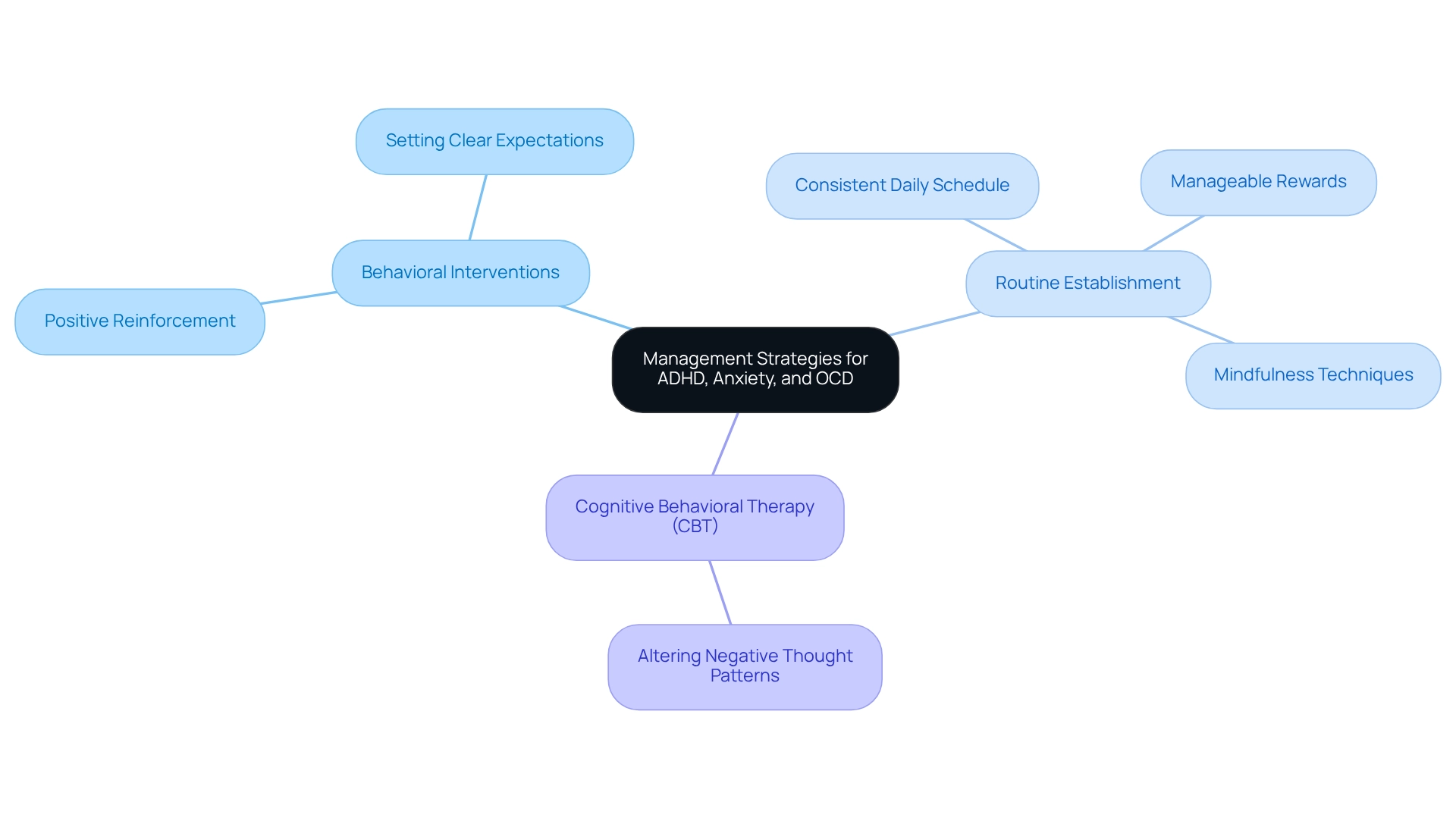
The Role of Therapy and Counseling in Treatment
Therapy and counseling play a crucial role in the effective management of ADHD, anxiety, and OCD. These interconnected conditions can be challenging for both children and their families, but various therapeutic approaches have shown promise in providing relief and support.
Cognitive Behavioral Therapy (CBT) is one such evidence-based method that empowers children to recognize and alter negative thought patterns and behaviors. Research indicates that CBT can significantly improve symptoms of anxiety and OCD, making it a cornerstone of treatment strategies.
Another effective approach is Exposure and Response Prevention (ERP), which is particularly beneficial for those struggling with OCD. This structured process involves gradually exposing individuals to anxiety-inducing situations while guiding them to refrain from engaging in compulsive behaviors. Many have found this technique effective in reducing OCD symptoms, allowing them to develop healthier coping mechanisms.
Family therapy is also an important component. Involving the family in therapeutic processes can enhance communication and support systems, creating a more empathetic and understanding home environment. This method not only assists the person in treatment but also informs family members about the challenges related to ADHD, anxiety, and OCD, promoting a collaborative support network.
Recent studies emphasize the significance of customized therapeutic interventions. For instance, a study on the comorbidity of attention deficit hyperactivity disorder in adult OCD patients revealed that those with the condition experienced a lower mean improvement rate on the Yale-Brown Obsessive Compulsive Scale after six months of treatment compared to those without it. This underscores the necessity for specialized treatment plans that address the complexities of comorbid conditions.
It's important to note that OCD can arise in youngsters as early as 2 or 3 years of age, highlighting the significance of prompt intervention in therapy. As mentioned by Solanto and associates, forming new, more adaptive habits and functional routines in adults with attention challenges requires clear emphasis and repetition. This helps desired actions, such as checking a planner daily, become automatic and no longer reliant on the individual's active executive or decision-making capabilities.
Additionally, current research suggests that more investigations are necessary to examine treatment strategies for patients with OCD who also experience ADHD and anxiety. Parents are encouraged to work closely with mental health professionals to determine the most appropriate therapeutic alternatives for their children. By doing so, they can ensure a thorough approach to managing Attention-Deficit/Hyperactivity Disorder, stress, and OCD.
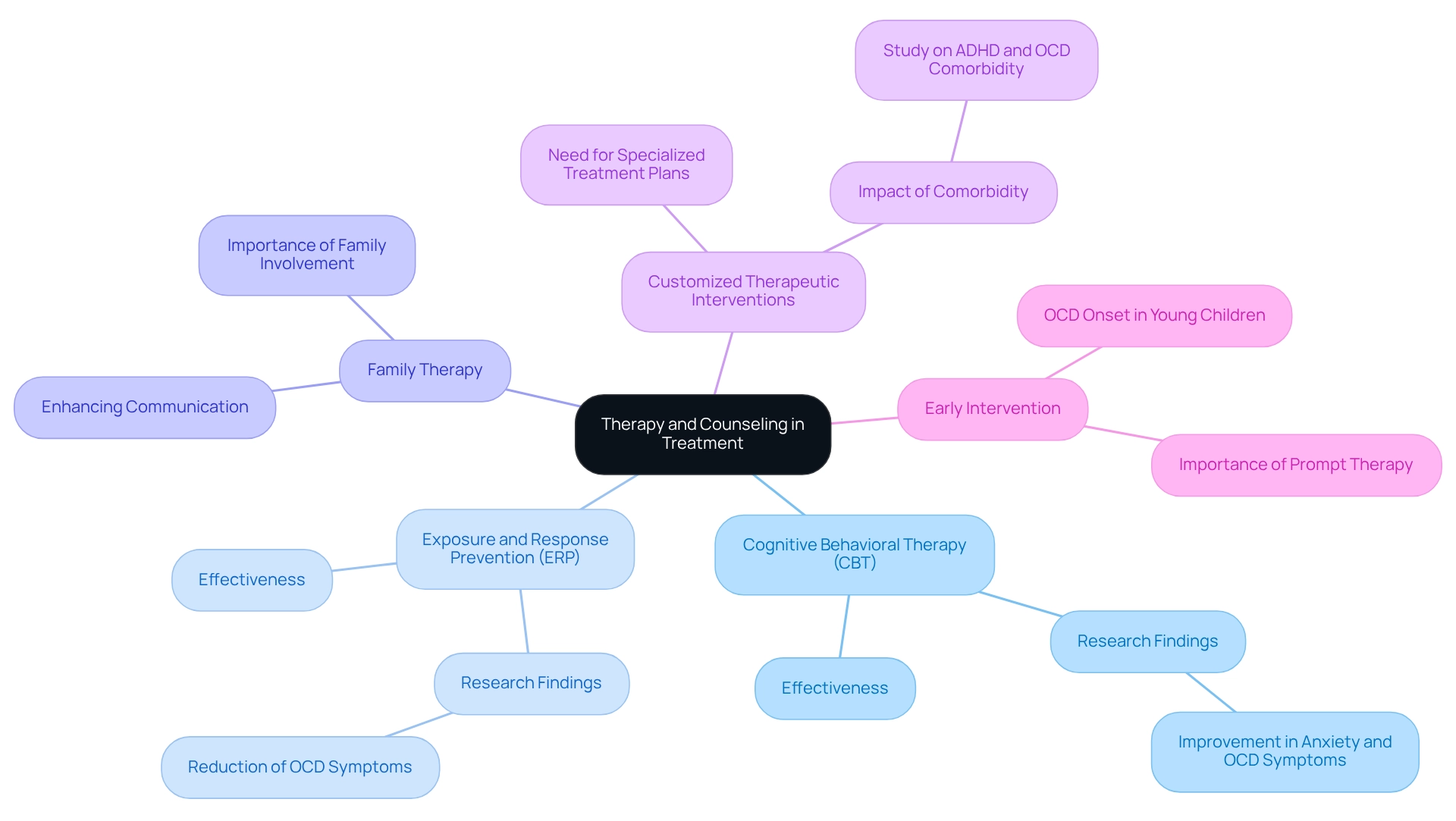
Creating a Supportive Home Environment for Children with ADHD, Anxiety, and OCD
Creating a nurturing home atmosphere is vital for children facing challenges like ADHD, anxiety, and OCD. By implementing the following strategies, you can significantly enhance their emotional and behavioral well-being.
- Minimize Distractions: Designate a quiet, organized space for homework and relaxation. This area should be free from unnecessary stimuli, allowing young learners to focus more effectively and reduce stress levels.
Research indicates that minimizing distractions can lead to substantial improvements in concentration and task completion, which is crucial for children with OCD.
- Establish Routines: Consistent daily schedules foster a sense of safety and predictability. Organized routines can alleviate stress and improve focus in children with ADHD, anxiety, and OCD.
Case studies reveal that children who engage in structured routines experience lower stress levels and better behavioral outcomes.
- Encourage Open Communication: It’s essential to cultivate an environment where children feel safe to express their emotions and challenges. Open dialogue builds trust and helps young people articulate their experiences, which can be therapeutic.
- Model Calm Behavior: Parents should practice and demonstrate relaxation techniques, such as deep breathing or mindfulness exercises. By exhibiting these behaviors, parents can teach children effective strategies for managing anxiety. Neuropsychologist Amitai Abramovitch notes that, unlike children with ADHD, those with OCD are rarely impulsive or risk-taking, highlighting the need for tailored approaches to these conditions.
These strategies not only create a supportive environment but also empower young individuals to navigate their emotional landscapes more effectively. Additionally, SSRIs are recognized as the primary treatment option for OCD in both children and adults, significantly alleviating symptoms. By adopting these strategies, parents can foster an environment that meets their children's unique needs and promotes overall well-being, in line with the evolving understanding of treatment approaches emphasized in recent multimodal studies on psychiatric disorders.
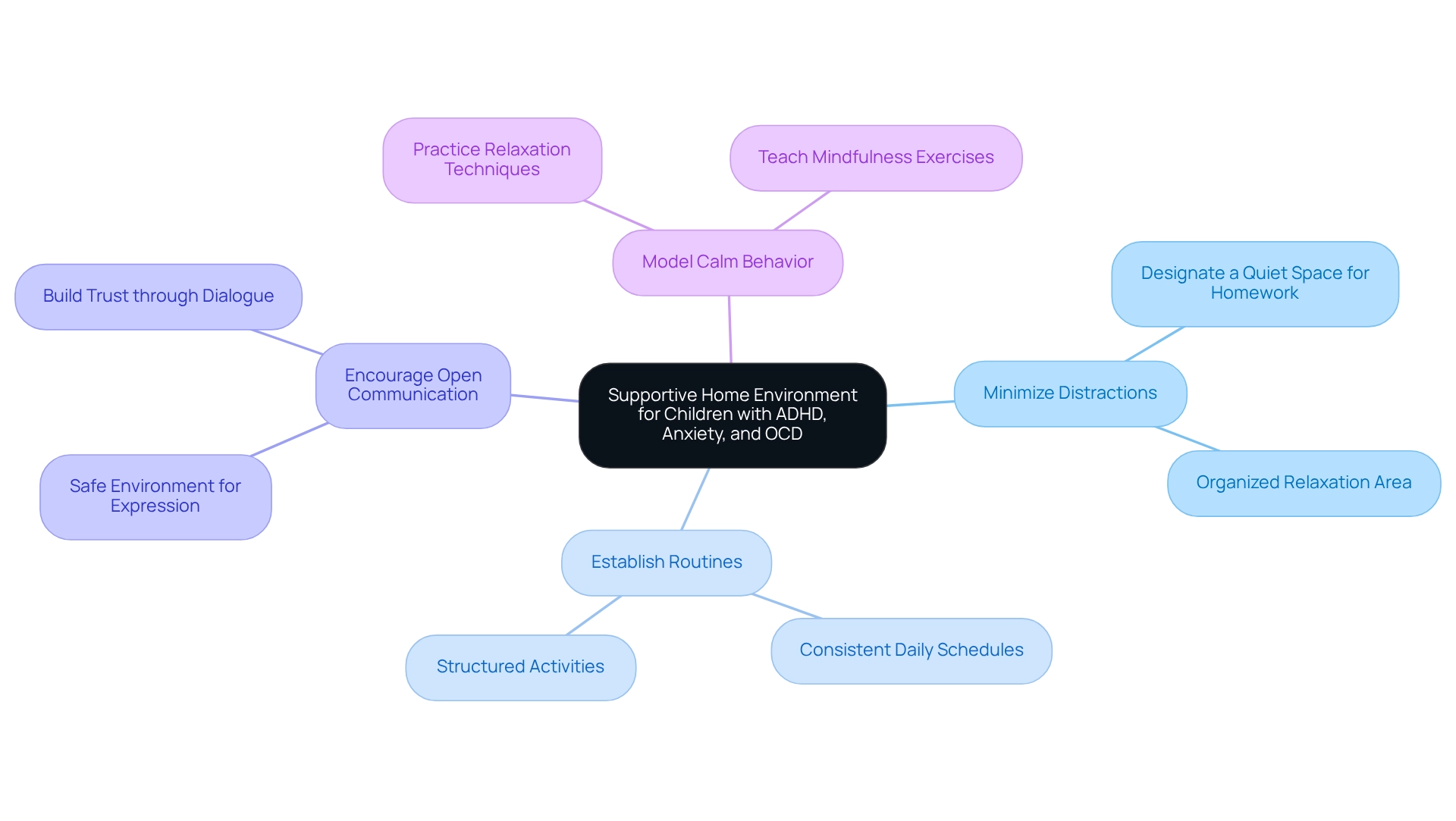
Collaborating with Educators and Healthcare Providers for Holistic Support
Collaboration with educators and healthcare providers is essential for delivering comprehensive support to youth facing ADHD, anxiety, and OCD—collectively referred to as ADHD anxiety OCD. Parents can implement several strategies to foster this vital collaboration:
- Communicate Regularly: Establish consistent communication with teachers and therapists to exchange insights and effective strategies. This ongoing conversation helps ensure that everyone involved in the young one’s care is on the same page. Notably, among those who had the opportunity to share results with teachers, 88.8% did so on a second occasion, highlighting the importance of sustained communication.
- Participate in IEP Meetings: Actively engage in Individualized Education Program (IEP) meetings when applicable. These meetings are essential opportunities for parents to advocate for their child's specific needs and ensure that suitable accommodations are in place.
- Share Resources: Equip educators with resources and strategies that have proven effective at home. Providing educators with these tools can enhance their understanding and ability to assist the student in the classroom.
- Seek Professional Guidance: Collaborate with healthcare providers to align all aspects of the patient's treatment plan. This holistic approach ensures that interventions for ADHD anxiety OCD are consistent across home, school, and clinical settings.
By fostering these collaborative connections, parents can create a strong support network that greatly improves their child's overall well-being. For instance, a recent study titled "Attention Deficit Hyperactivity Disorder Care Assistant: Enhancing Communication Between Parents and Teachers" aimed to improve communication regarding management by developing an email-based software that allows parents and teachers to share related information directly with clinicians. The study found that while 64% of parents chose to share survey results with teachers, only 16% of shared surveys were viewed by educators, indicating a need for strategies to encourage the viewing of shared information.
This emphasizes the significance of not only sharing information but also ensuring it is actively utilized in the care of the young one. Additionally, the National Institute of Mental Health (NIMH) estimates that 1.2% of adults have OCD, underscoring the importance of addressing these mental health issues. Furthermore, barriers related to contacting professionals and receiving support were significantly higher among help-seekers than non-help seekers, reinforcing the need for effective collaboration.
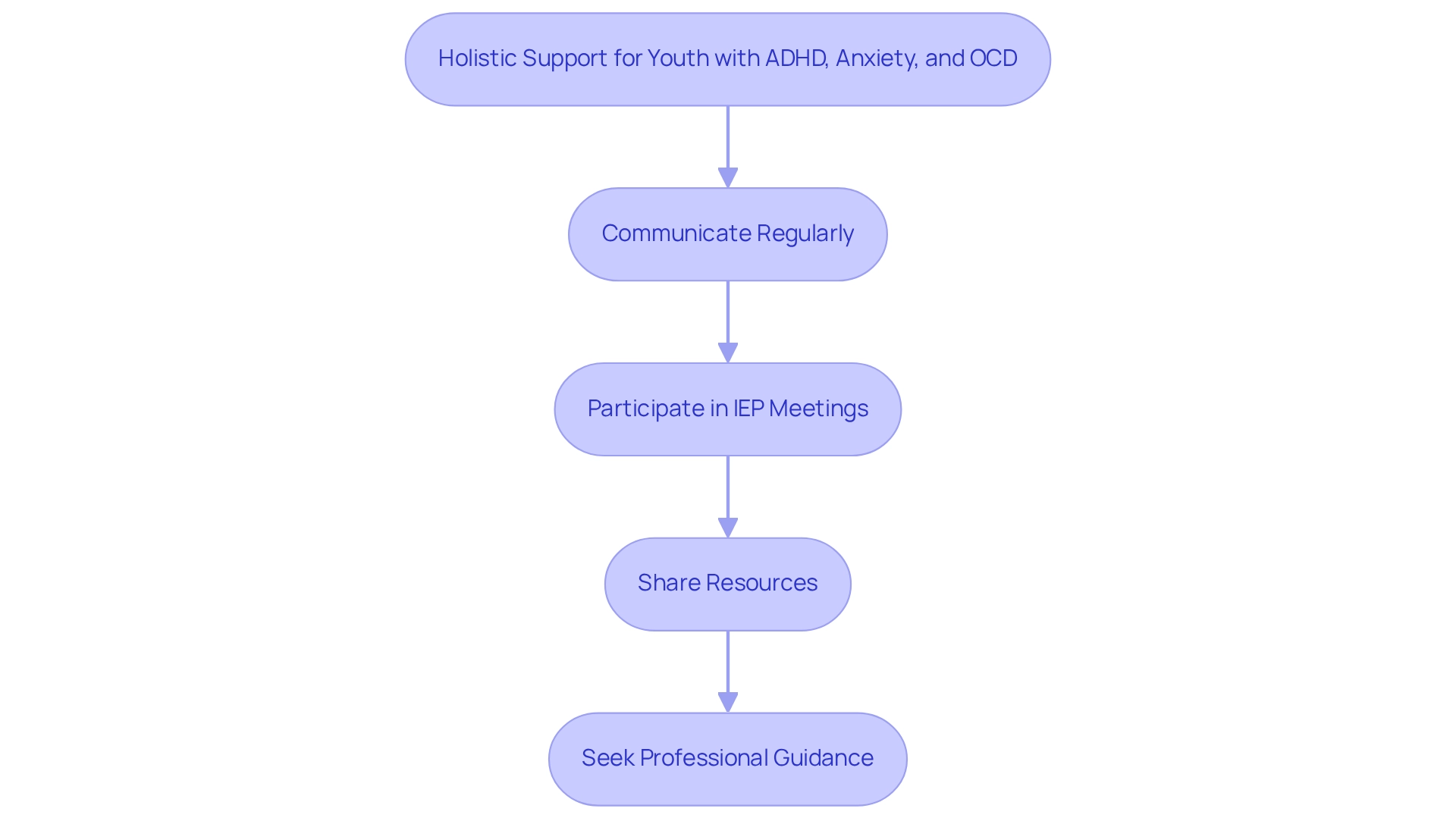
Resources and Tools for Parents: Finding Support and Information
Parents facing the challenges of OCD can find a wealth of resources and tools to support their journey. It's important to explore various avenues that can make a difference in your experience.
- Support Groups: Connecting with local or online support groups can be invaluable. These communities allow parents to share experiences, gain insights, and find encouragement from others who understand the struggles. Research shows that participation in support groups can significantly enhance emotional well-being and coping strategies. Notably, co-occurring behavioral health issues, such as ADHD, anxiety, and OCD, affect 70% to 90% of youth with ASD, impacting their quality of life.
- Educational Websites: Reputable websites like CHADD (Children and Adults with Attention-Deficit/Hyperactivity Disorder) and the International OCD Foundation offer a plethora of information and resources. These platforms guide you in managing symptoms, understanding treatment options, and accessing community support.
A variety of literature is also available, focusing on parenting children with ADHD, anxiety, and OCD. These books often include practical strategies, expert insights, and personal anecdotes, empowering you with knowledge and confidence in your parenting journey.
- Professional Organizations: Engaging with professional groups focused on attention disorders and OCD can provide access to training, workshops, and additional resources. These organizations emphasize the latest research and best practices, ensuring you are well-informed about effective management strategies. Dr. Lauren Smith notes, "For additional details on how therapy can assist with Childhood attention disorders, listen to this episode of the Parent Matters Podcast."
- Case Studies: Research such as the "Movement and Brain Activation Analysis" highlights shared and disorder-specific brain activation patterns in ADHD and OCD. This enhances our understanding of how these conditions affect decision-making and reward processing.
By leveraging these resources, you can feel more equipped and supported in managing your child's conditions. This ultimately enhances quality of life and fosters a nurturing environment for growth. At ASD Media, we are committed to building a supportive community that encourages collaboration and growth within the ABA therapy industry, empowering both parents and professionals alike.
Conclusion
Navigating the intertwined challenges of ADHD, anxiety, and OCD in children can feel overwhelming for parents. Understanding these conditions and their symptoms is crucial, as the overlap can complicate diagnosis and treatment. Early intervention and tailored management strategies are essential, and parents play a pivotal role in recognizing symptoms and advocating for their children’s needs. By ensuring that their children receive the appropriate support, families can make a significant difference in their well-being.
Implementing effective management strategies is key. Establishing routines, utilizing behavioral interventions, and incorporating therapeutic approaches like Cognitive Behavioral Therapy can greatly enhance a child's ability to cope with their symptoms. Creating a supportive home environment and fostering open communication with educators and healthcare providers strengthens the support network that is vital for a child’s success.
Moreover, accessing available resources, such as support groups and educational materials, empowers parents to navigate this journey with confidence and knowledge. By fostering an understanding and nurturing environment, families can help children thrive despite the challenges posed by ADHD, anxiety, and OCD, paving the way for a brighter future. The collective effort of parents, educators, and healthcare professionals is not just beneficial; it is vital in promoting mental health and ensuring that children can reach their full potential. Together, we can create a supportive community that uplifts our children and helps them flourish.
Frequently Asked Questions
What is Attention-Deficit/Hyperactivity Disorder (ADHD)?
ADHD is a neurodevelopmental condition characterized by ongoing patterns of inattention, hyperactivity, and impulsivity, making it difficult for affected children to focus on tasks, follow instructions, and stay seated during activities.
How does ADHD affect children's academic performance and social interactions?
The symptoms of ADHD can significantly impact a child's academic performance and social interactions, often leading to concerns from parents and guardians who seek support.
What is the relationship between ADHD and anxiety disorders?
Children with ADHD frequently exhibit signs of anxiety, such as restlessness, fatigue, and difficulty concentrating. Nearly 40% of youngsters with ADHD also struggle with anxiety, indicating a common overlap between these conditions.
What percentage of youth diagnosed with ADHD also have other conditions?
An alarming 78% of youth diagnosed with ADHD have at least one additional condition, with behavioral issues and anxiety being the most prevalent.
What is Obsessive-Compulsive Disorder (OCD) and how does it relate to ADHD?
OCD is characterized by intrusive thoughts and repetitive actions that individuals feel compelled to perform. It can occur alongside ADHD and anxiety, complicating the management of these conditions.
What are the key symptoms of ADHD, anxiety, and OCD?
ADHD: Inattention, hyperactivity, impulsivity. Anxiety: Excessive worry, restlessness, fatigue. OCD: Intrusive thoughts, compulsive behaviors.
Why is it important for parents and caregivers to recognize these symptoms?
Recognizing the symptoms of ADHD, anxiety, and OCD is essential for parents and caregivers as it helps lay the groundwork for effective management and intervention.
How does Medicaid affect access to ADHD treatment?
Individuals with Medicaid may be less likely to receive ADHD treatment from healthcare professionals, highlighting the need for advocacy to secure appropriate care.
What challenges do children with ADHD, anxiety, and OCD face?
Children often experience behavioral issues, social difficulties, and academic challenges, which can lead to emotional distress and further complications in daily life.
What is the significance of early identification and intervention for OCD?
Early identification and intervention for OCD are crucial for effective management, especially since OCD can emerge in younger individuals, although its typical age of onset is around 19 years.




